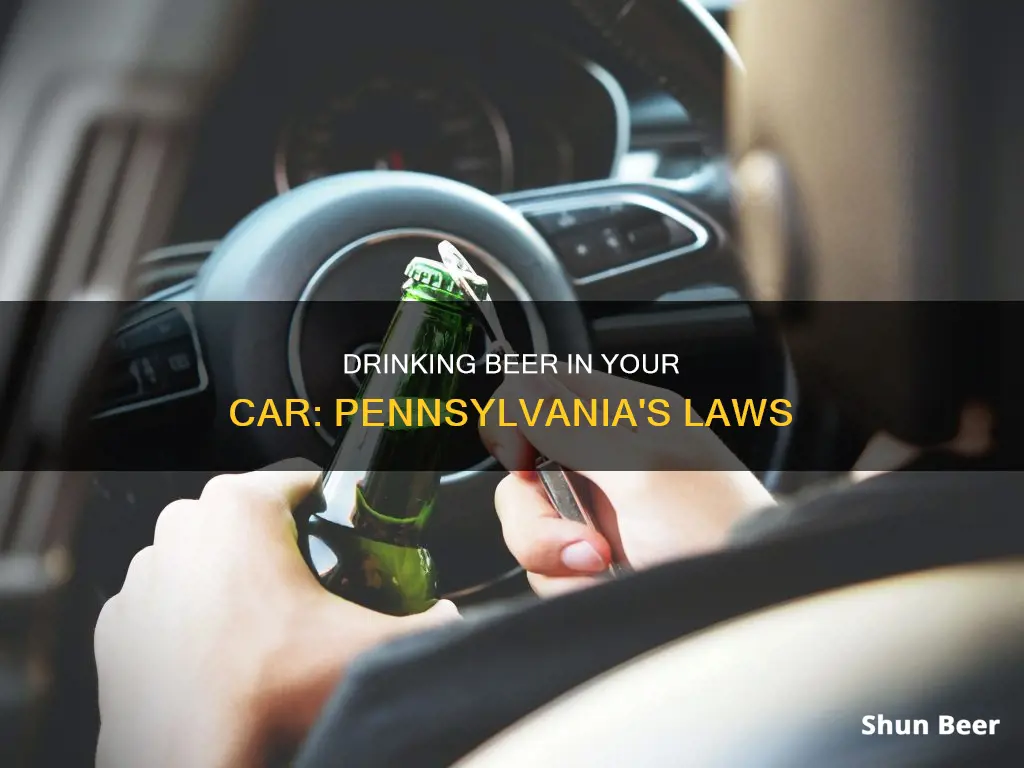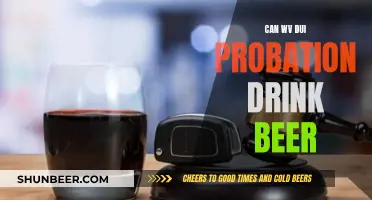
Drinking and driving is illegal in most places, but what about drinking as a passenger? In Pennsylvania, open container laws apply to both the driver and the passenger in a vehicle. This means that neither a driver nor a passenger can possess an open alcoholic beverage container while on the roads. However, there are some exceptions to this rule, such as when passengers are in limousines, buses, or taxis. Understanding the specifics of open container laws is crucial for avoiding legal consequences, which can include fines and jail time.
| Characteristics | Values |
|---|---|
| Can drivers drink beer in a car? | No |
| Can passengers drink beer in a car? | No, unless in a bus, taxi, or limousine |
| Can passengers drink beer in other vehicles? | Yes, in the living quarters of a house coach, RV, or trailer |
| What constitutes an open container? | A broken seal, previously opened, or with some contents removed |
| Where can open containers be transported? | In the trunk of a vehicle |
| What are the penalties for violating open container laws? | A summary offense, a fine of up to $300, up to 90 days in jail, license suspension, and increased insurance rates |
What You'll Learn

Passengers in buses, taxis and limousines can drink alcohol
In Pennsylvania, open container laws apply to both drivers and passengers of motor vehicles. This means that neither a driver nor a passenger can have an open alcoholic beverage in a vehicle. However, there are exceptions to this rule, and passengers in buses, taxis, and limousines can legally drink alcohol.
Passengers in certain types of vehicles are exempt from Pennsylvania's open container law. This includes passengers in buses, taxis, and limousines, who are allowed to consume alcoholic beverages or possess open containers in the passenger area. This exception applies to vehicles primarily used for transporting people for compensation.
It's important to note that the alcohol must be kept in the back of the vehicle or in a designated passenger area where the driver cannot access it. Additionally, the consumption of alcohol is not a decisive factor in determining a violation of the open container law. Even if the bottle is simply open and neither party is drinking, it is still considered a violation.
While passengers in these exempt vehicles are allowed to drink alcohol, it is crucial to be mindful of the amount consumed. Overindulging can lead to intoxication, which may result in charges if the passenger exhibits signs of impairment or is deemed a danger to themselves or others.
If you're a passenger drinking alcohol in a bus, taxi, or limousine in Pennsylvania, it's important to be aware of the legal exceptions to the open container law. Remember to keep the alcohol in the designated passenger area and always drink responsibly.
Sweet Drinks and Beer: A Healthy Mix?
You may want to see also

Open containers in the trunk or non-passenger areas of a vehicle
Pennsylvania's open container law prohibits the possession of open alcoholic beverage containers in a motor vehicle. This law applies to both the driver and passengers of the vehicle. However, there are exceptions for certain types of vehicles, such as buses, taxis, and limousines, where passengers are allowed to consume alcohol in the passenger area.
In terms of open containers in the trunk or non-passenger areas of a vehicle, Pennsylvania's open container law specifically applies to the passenger areas of the vehicle. This means that areas of the vehicle that the driver or passengers cannot easily access are generally exempt from the law. So, transporting an open container in the trunk of a vehicle is typically allowed.
It is important to note that the actual consumption of alcohol is not a decisive factor when determining a violation of the open container law in Pennsylvania. Even if alcohol is not being consumed, simply having an open container in the passenger area of the vehicle can be considered a violation.
The open container law in Pennsylvania is codified at 75 Pa.C.S.A. § 3809. Violating this law is considered a summary offense, which can result in penalties such as monetary fines and license suspension. These penalties can be enhanced depending on the surrounding circumstances and prior criminal history.
Beer and Advil: A Safe Mix?
You may want to see also

Police can't pull over a vehicle without probable cause
In Pennsylvania, it is illegal for a driver or a passenger in a motor vehicle located on a highway to possess an open alcoholic beverage container or to consume a controlled substance or alcoholic beverage. However, there are exceptions that allow passengers to drink alcohol in certain types of vehicles, such as buses, taxis, and limousines.
Now, regarding police powers to pull over a vehicle, officers generally must have a reasonable suspicion that the driver or someone in the vehicle is committing or has committed a crime. Minor traffic violations are usually enough to meet this threshold. For example, if you ran a stop sign or were speeding, the police are justified in pulling you over. However, a hunch or a gut feeling is not sufficient for a legal traffic stop. The police normally need an objective reason to believe that a law has been broken.
In the case of Delaware v. Prouse, the Supreme Court held that a police officer conducting a "spot check," based solely on their discretion, is unconstitutional. Therefore, police officers cannot pull over a vehicle without probable cause or reasonable suspicion that a crime has been committed. They cannot simply pull someone over to check their driver's license and vehicle registration.
If you are pulled over by an unmarked police car, you have the right to verify that it is a legitimate law enforcement vehicle. All unmarked police cars in your area should have permanent red and blue lights built-in, and officers driving them will have proper identification. You can call the police station or 911 to confirm that a traffic stop is being conducted by an officer.
A Beer Kegerator's Working: Understanding the Basics
You may want to see also

Passengers in RVs and trailers are allowed to drink alcohol
In Pennsylvania, open container laws apply to both drivers and passengers of motor vehicles. This means that neither a driver nor a passenger can possess an open alcoholic beverage container while on the roads. However, there are exceptions to this rule, and passengers in RVs and trailers are allowed to drink alcohol and possess open containers of alcohol.
Pennsylvania's open container law states that it is unlawful for a driver or passenger in a motor vehicle to possess an open alcoholic beverage container or consume an alcoholic beverage. This law applies to vehicles located on a highway and the actual consumption of alcohol is not a decisive factor in determining whether the law has been violated. Even if neither party was drinking, the presence of an open container is still a violation.
The open container law in Pennsylvania defines an 'open alcoholic beverage container' as any bottle, can, or receptacle that contains any amount of alcoholic beverage and is open, has a broken seal, or has had its contents partially removed. This law applies to both drivers and passengers of motor vehicles and the vehicle does not need to be in motion for the law to apply.
However, there are exceptions to Pennsylvania's open container law, and passengers in RVs and trailers are allowed to drink alcohol and possess open containers. The law states that the consumption of alcohol or possession of open containers of alcohol in the living quarters of a house coach or house trailer is permitted. This exception also applies to passengers in buses, taxis, and limousines, who are allowed to consume alcohol or possess open containers in the passenger area of the vehicle.
It is important to note that the alcohol must be in the back of the vehicle or in the living quarters where the driver does not have access to it. If a passenger is found to be in violation of Pennsylvania's open container law, they may be charged with an ''open container violation' and face penalties including a fine of up to $300 and up to 90 days in jail.
Fitbit Beers: Compatible with Pixel 2?
You may want to see also

What constitutes an open container violation in Pennsylvania?
In Pennsylvania, open container laws apply to both drivers and passengers of motor vehicles. The law prohibits drivers and passengers from possessing open alcoholic beverages in a vehicle. The actual consumption of alcohol is not a decisive factor when police attempt to determine whether the open container law has been violated.
The open container law in Pennsylvania is codified at 75 Pa.C.S.A. § 3809. However, there are exceptions to this law. Passengers in buses, taxis, and limousines are allowed to drink alcohol and possess open containers of alcohol. Additionally, passengers in RVs and trailers are also permitted to drink alcohol and have open containers.
Pennsylvania's open container law applies to the passenger areas of a vehicle, which are areas that the driver or passengers can easily access. Therefore, transporting an open container in the trunk of a vehicle is generally allowed.
The penalties for violating Pennsylvania's open container law include a maximum fine of $300 and/or up to 90 days in jail. These penalties can be enhanced depending on the surrounding circumstances and prior criminal history.
While the law in Pennsylvania does not explicitly define "open container", it is likely that a court would use a common-sense approach and consider a container with a broken seal or with some of its contents removed as an open container.
Beer and Augmentin: Safe Mix?
You may want to see also
Frequently asked questions
No, you cannot drink beer in a car in Pennsylvania. The state's open container laws apply to both the driver and the passenger in a vehicle.
An open container is defined as any bottle, can, or receptacle that contains any amount of alcoholic beverage and is open, has a broken seal, or has had its contents partially removed.
A conviction of violating Pennsylvania's open container law is a summary offense that can carry a fine of up to $300 to $500 and up to 90 days in jail. You could also lose your driver's license and face increased insurance rates.
Yes, there are exceptions for certain types of vehicles. Passengers in limousines, buses, taxis, house coaches, RVs, and trailers are allowed to drink alcohol.







